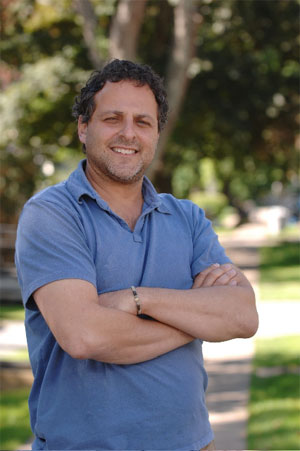 |
| A paper published in a journal wasn't enough for social work professor Jeff Karabanow: "I wanted a more popular medium and to have young people speak for themselves."┬Ā(Danny Abriel Photo) |
She calls herself one of those ŌĆ£dirty, poor kidsŌĆØŌĆöout of her momŌĆÖs house when she turned 16 and since then constantly on the move.┬Ā
From her usual perch on a curb or the sidewalk in yet another city, her perspective is one of a young person looking up.
ŌĆ£When you live on the street, you are literally beneath people, so you start to feel that way too,ŌĆØ says Janine, her black hoodie pulled up so it obscures her pale face. ŌĆ£WeŌĆÖre looked down on too. People donŌĆÖt understand us at all.
ŌĆ£But I have decided that I can get up. IŌĆÖm not going to sit anymore.ŌĆØ
Extending a hand in support is an innovative film project out of ┬ķČ╣┤½├Į which is giving homeless youth the tools and the knowledge to tell their own stories about life on the street. For the past three months, a small group of five street kidsŌĆötogether with youth worker Darcy Harvey, a ┬ķČ╣┤½├Į social work grad, and filmmaker Bryan Hofbauer, who has produced such films as 3 Needles and The EventŌĆöhave been meeting three days a week in an empty storefront on Agricola Street. The participants have learned such skills as camera work, storyboarding, how to develop characters, script writing, editing and composing.
In the case of JanineŌĆönot her real nameŌĆösheŌĆÖs learned a lot more besides. As a talented artist who enjoys drawing and painting, she felt the best medium for her film about life on the street was animation. That meant she had to learn how to do it.
ŌĆ£ItŌĆÖs been so nice to have someone say, ŌĆśWhat do you need?ŌĆÖŌĆØ says the 21-year-old who no longer lives on the street. ŌĆ£It was never ŌĆśno.ŌĆÖ It was always, ŌĆśweŌĆÖll find a way.ŌĆÖŌĆØ
The film project is the initiative of Jeff Karabanow with DalŌĆÖs School of Social Work and Jean Hughes with the School of Nursing. The project is funded through a $50,000 dissemination grant from the Social Sciences and Humanities Research Council of Canada.┬Ā
The professors had collaborated on a research paper, ŌĆ£Can you be healthy on the street?ŌĆØ published last summer in the Canadian Journal of Urban Research. But for Dr. Karabanow, who worked on a documentary with street kids in Guatemala a few years ago, it wasnŌĆÖt enough. ŌĆ£I wanted a more popular medium and to have young people speak for themselves,ŌĆØ he says.
The students are now putting finishing touches on three short films. Besides JanineŌĆÖs animated film which illustrates a poem she wrote, there are two documentaries. One, about the challenges of working with street youth, has inspired its creator to enroll in community college in Truro as a youth worker. In the other, a 25-year-old couch surfer who was kicked out of the family home when he was 15 has interviewed street kids about their mental health and the challenges of getting by day to day. ŌĆ£I think they connect with me because IŌĆÖm on the same level as them,ŌĆØ he explains.
Dr. Karabanow says heŌĆÖs blown away by the talent heŌĆÖs seen. He hopes the films will get an audience at local schools and film festivals across the country, including the Atlantic Film FestivalŌĆÖs Viewfinders International Film Festival for Youth, in Halifax next spring.
ŌĆ£This experience reiterated to me just how talented and passionate these young people are,ŌĆØ he says. ŌĆ£It reminds me how much creativity they have, and not only in surviving on the street.ŌĆØ
HeŌĆÖs so impressed that heŌĆÖs hired two of the participants to pitch in on a new research study, about the work young people do to support themselves when theyŌĆÖre homeless. The $50,000 study funded by federal department of Human Resources and Social Development, will involve in-depth interviews with 40 street kids locally and 20 service providers across Canada.
ŌĆ£Most of these kids are working, whether theyŌĆÖre panhandling, squeegeeing or doing day labour in the formal economy. What weŌĆÖre seeing is that the Nova ScotiaŌĆÖs safe street legislation which prohibits these activities is pushing kids back into illegal activity, the hidden economy. And they are feeling attacked for being poor and being different.ŌĆØ
